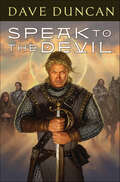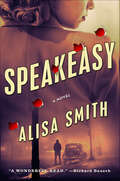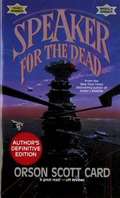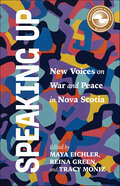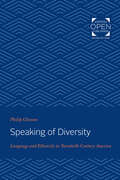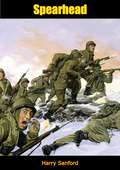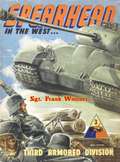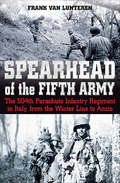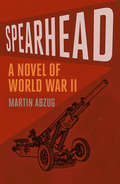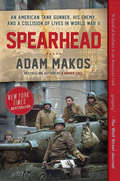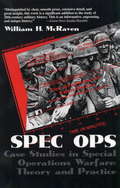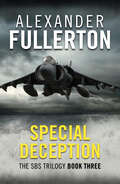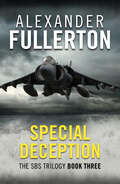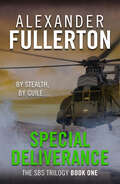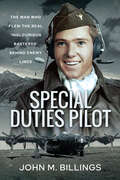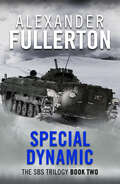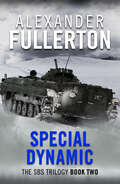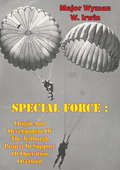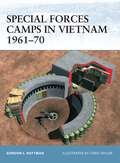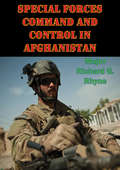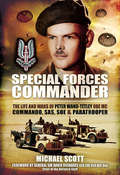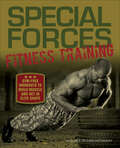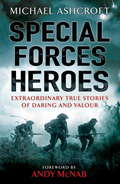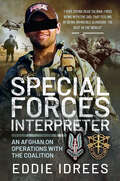- Table View
- List View
Speak to the Devil (The Brothers Magnus #1)
by Dave DuncanA new adventure of brotherhood and magic from beloved fantasist Dave Duncan In the Kingdom of Jorgary, the days of feudal chivalry are fading as national armies are formed. But Ottokar Magnus is still baron, and his host of brothers include Anton, an ambitious young soldier, and Wulfgang, an amiable teenager. Unable to seek his fortune as a knight errant, Anton has enlisted with the royal Jorgarian hussars and taken Wulf along as his servant. There is magic in Jorgary, but it is regarded as Satanism, rituals performed by Speakers who are in contact with the Devil. The Speakers, though, believe that the Voices they hear belong to saints. Anton is not a Speaker...but Wulf is. Anxious to impress the court, Anton exhibits spectacular horsemanship at a royal hunt, with a little boost from Wulf. Two nights later he is dragged before Cardinal Zdenek, the king's chief minister. Zdenek offers him an earldom and anything else he could dream of if he will ride at once to a strategic fortress at Cardice and take command there. The count and his son have died, victims of both treason and witchcraft. The cardinal thinks that neighboring enemies are preparing to invade, using "modern" arms to capture the fort. Mortal resources alone will not suffice, but Zdenek knows that Anton's improbable jump at the hunt was aided by supernatural power. Anton wants nothing to do with this mission, but Wulf's Voices tell him that they should accept the charge. The result is a harrowing ride through limbo with astonishing results.At the Publisher's request, this title is being sold without Digital Rights Management Software (DRM) applied.
Speakeasy: A Novel (Lena Stillman Series)
by Alisa SmithA WALTER SCOTT PRIZE ACADEMY RECOMMENDED BOOK OF 2018!In this literate and action-packed historical thriller, set during World War II, a plucky code-breaker fights to keep a deadly secret as her Bonnie-and-Clyde past threatens to catch up with her. Thirty-year-old Lena Stillman is living a perfectly respectable life when a shocking newspaper headline calls up her past: it concerns her former lover, charismatic bank robber Bill Bagley. A romantic and charming figure, Lena had tried to forget him by resuming her linguistic studies, which led to her recruitment as a Navy code-breaker intercepting Japanese messages during World War II. But can Lena keep her own secrets? Threatening notes and the appearance of an old diary that recalls her gangster days are poised to upset her new life. Whom can she really trust? Is there a spy among the code-breakers? And who is it that wants her dead?“Alisa Smith’s novel Speakeasy, set in the thirties and forties, is written with great authority. A wonderful read, and very convincing.” —Richard Bausch, author of Something Is Out There and Peace
Speaker for the Dead (Ender's Game #2)
by Orson Scott CardIn the aftermath of his terrible war, Ender Wiggin disappeared, and a powerful voice arose: The Speaker for the Dead, who told the true story of the Bugger War.<P><P> Now, long years later, a second alien race has been discovered, but again the aliens' ways are strange and frightening...again, humans die. And it is only the Speaker for the Dead, who is also Ender Wiggin the Xenocide, who has the courage to confront the mystery...and the truth.<P> Speaker for the Dead, the second novel in Orson Scott Card's Ender Quintet, is the winner of the 1986 Nebula Award for Best Novel and the 1987 Hugo Award for Best Novel.
Speaking Up: New Voices on War and Peace in Nova Scotia
by Maya Eichler, Reina Green, and Tracy MonizThe story of Nova Scotia’s history is usually presented through the lens of military history. Lost in that narrative are the less visible stories of war and peace: contemporary stories told from outside the military community; anti-militarist stories; and stories of soldiers who don’t fit the white, cisgender male, heterosexual norm. Speaking Up: New Voices on War and Peace in Nova Scotia brings many previously neglected voices to the fore—voices of current members of the Canadian Armed Forces and military veterans, members of the African Nova Scotian and Mi’kmaw communities, refugees and immigrants displaced by war, historians and other academics who study war and militarization, artists who reflect on war’s impact, and peace activists who vigorously protest against the militarization of the region. These fresh perspectives on war and peace in Nova Scotia—from voices that include Darl Wood, El Jones, Sylvia Parris, Peter Dykhuis, Jessica L. Wiebe, Paige Farah, Catherine Martin, and Juanita Peters—light the way to a more comprehensive understanding of the impact of war on our province. Through more than thirty unique stories carefully curated by an expert editorial team from Mount Saint Vincent University in Halifax, Speaking Up: New Voices on War and Peace in Nova Scotia sets out to challenge the dominant military narrative on war and peace in Nova Scotia.
Speaking of Diversity: Language and Ethnicity in Twentieth-Century America
by Philip GleasonOriginally published in 1992. In this collection of essays, Philip Gleason explores the different linguistic tools that American scholars have used to write about ethnicity in the United States and analyzes how various vocabularies have played out in the political sphere. In doing this, he reveals tensions between terms used by academic groups and those preferred by the people whom the academics discuss. Gleason unpacks words and phrases—such as melting pot and plurality—used to visualize the multitude of ethnicities in the United States. And he examines debates over concepts such as "assimilation," "national character," "oppressed group," and "people of color." Gleason advocates for greater clarity of these concepts when discussed in America's national political arena. Gleason's essays are grouped into three parts. Part 1 focuses on linguistic analyses of specific terms. Part 2 examines the effect of World War II on national identity and American thought about diversity and intergroup relations. Part 3 discusses discourse on the diversity of religions. This collection of eleven essays sharpens our historical understanding of the evolution of language used to define diversity in twentieth-century America.
Spearhead
by Harry SanfordOPERATION KILLER: THE SAVAGE SLAUGHTER…The war in Korea was not, officially, a war, even though men died fighting it. The conditions were unlike those encountered in any other theatre of war. In this novel, based on some of the experiences of the author, we meet men of the 23rd Regiment of the United States Second Infantry Division. The year: 1951. The place: Chipyong-Ni, the scene of the last major offensive by the Red Chinese.In this stark, tough, and at times, crude book, Harry Sanford makes no attempt to psycho-analyse the men, but rather to analyse the situations in which they found themselves. It is a sincerely written story and—the author assures us—a true picture of men at war.
Spearhead In The West, 1941-1945: The Third Armored Division
by Sgt. Frank WoolnerThe story of Spearhead in the West recounts the early history of the 3rd Armored Division, its training in various locations, both in the United States and in England, and its combat record from Normandy to the banks of the River Elbe, in Germany. The book is conveniently divided into three distinct sections: the combined history and battle lore of the entire division. The first section is given over to an introduction of "Spearhead" units and organization. The second section provides a popular narrative account, together with sketches and photographs of important scenes, persons and events. The third and final section retells the accurate battle history of the division as compiled from the mass of official documents, journals and records.A narrative of hard training and bitter combat, of local reverses and the stunning victory that befits a great armored division, this book is a must-read for any history buff.
Spearhead of the Fifth Army: The 504th Parachute Infantry Regiment in Italy, from the Winter Line to Anzio
by Frank van Lunteren&“An excellent read for anyone interested in men at war, as well as for students of the airborne operations, the Italian Campaign, and the war in Europe&” (The NYMAS Review). Upon the completion of the Sicily and Salerno Campaigns in 1943, the paratroopers of Col. Reuben Tucker&’s 504th Parachute Infantry Regiment were among the first Allied troops to enter Naples—a ghost town at first sight. The residents soon expressed their joy at being liberated. Four weeks later, the 504th—upon the special request of Gen. Mark Clark—spearheaded Fifth Army&’s drive through the notorious Volturno Valley—the Germans&’ next stand. January 1944 seemed to promise a period of rest, but the landing at Anzio meant deployment for the paratroopers again, this time by ship. A bombing raid during their beach landing was a forecast of eight weeks of bitter fighting. Holding the right flank of the beachhead along the Mussolini Canal, the paratroopers earned their nickname &“Devils in Baggy Pants&” for their frontline incursions into enemy lines, as well as their stubborn defense of the Allied salient. In this work, H Company&’s attachment to the British 5th Grenadier Guards—and the Victoria Cross action of Maj. William Sidney—are painted in comprehensive light for the first time. The story of honorary member of the 504th PIR, Italian veteran Antonio Taurelli, is also included. Using war diaries, personal journals, letters, and interviews with nearly eighty veterans, an up-close view of the 504th PIR in the Fifth Army&’s Italy Campaign is here in unsurpassed detail. From the author of two previous works on the 504th PIR, The Battle of the Bridges and Blocking Kampfgruppe Peiper, this book shows that the Italian theater was second to none in terms of grueling combat, courage against formidable odds, and an extremely expert enemy.
Spearhead: A Novel of World War II
by Martin AbzugSpearhead, first published in 1946, is a fictional account of U.S. Army artillery and infantry units at the start of the Battle of the Bulge in World War II. Initially forced to retreat, the men try to regain the offensive under heavy ground fire and aerial bombardment. Tensions mount between several of the officers, one of German descent, who are at odds over the nature of evil and the war. Their differences become especially apparent in their views of Germans and Naziism, and is reflected in their differing treatment of their captured prisoners-of-war. Spearhead is a little known novel of the War, but is filled with details based on the author’s own wartime experiences, plus examines the deeper moral questions of the conflict.
Spearhead: An American Tank Gunner, His Enemy, and a Collision of Lives in World War II
by Adam MakosFrom the New York Times bestselling author of A Higher Call comes the riveting World War II story of an American tank gunner’s journey into the heart of the Third Reich, where he will meet destiny in an iconic armor duel—and forge an enduring bond with his enemy. <p><p> When Clarence Smoyer is assigned to the gunner’s seat of his Sherman tank, his crewmates discover that the gentle giant from Pennsylvania has a hidden talent: He’s a natural-born shooter. At first, Clarence and his fellow crews in the legendary 3rd Armored Division—“Spearhead”—thought their tanks were invincible. Then they met the German Panther, with a gun so murderous it could shoot through one Sherman and into the next. Soon a pattern emerged: The lead tank always gets hit. After Clarence sees his friends cut down breaching the West Wall and holding the line in the Battle of the Bulge, he and his crew are given a weapon with the power to avenge their fallen brothers: the Pershing, a state-of-the-art “super tank,” one of twenty in the European theater. But with it comes a harrowing new responsibility: Now they will spearhead every attack. <p> That’s how Clarence, the corporal from coal country, finds himself leading the U.S. Army into its largest urban battle of the European war, the fight for Cologne, the “Fortress City” of Germany. Battling through the ruins, Clarence will engage the fearsome Panther in a duel immortalized by an army cameraman. And he will square off with Gustav Schaefer, a teenager behind the trigger in a Panzer IV tank, whose crew has been sent on a suicide mission to stop the Americans. As Clarence and Gustav trade fire down a long boulevard, they are taken by surprise by a tragic mistake of war. What happens next will haunt Clarence to the modern day, drawing him back to Cologne to do the unthinkable: to face his enemy, one last time. <p><b>A New York Times Bestseller</b>
Spec Ops
by William H. McravenVice Adm. William H. McRaven helped to devise the strategy for how to bring down Osama bin Laden, and commanded the courageous U.S. military unit that carried it out on May 1, 2011, ending one of the greatest manhunts in history. In Spec Ops, a well-organized and deeply researched study, McRaven analyzes eight classic special operations. Six are from WWII: the German commando raid on the Belgian fort Eben Emael (1940); the Italian torpedo attack on the Alexandria harbor (1941); the British commando raid on Nazaire, France (1942); the German glider rescue of Benito Mussolini (1943); the British midget-submarine attack on the Tirpitz (1943); and the U.S. Ranger rescue mission at the Cabanatuan POW camp in the Philippines (1945). The two post-WWII examples are the U.S. Army raid on the Son Tay POW camp in North Vietnam (1970) and the Israeli rescue of the skyjacked hostages in Entebbe, Uganda (1976). McRaven--who commands a U.S. Navy SEAL team--pinpoints six essential principles of "spec ops" success: simplicity, security, repetition, surprise, speed and purpose. For each of the case studies, he provides political and military context, a meticulous reconstruction of the mission itself and an analysis of the operation in relation to his six principles. McRaven deems the Son Tay raid "the best modern example of a successful spec op [which] should be considered textbook material for future missions." His own book is an instructive textbook that will be closely studied by students of the military arts. Maps, photos.
Special Deception (SBS Trilogy)
by Alexander FullertonAn incredibly dangerous and secret mission in a tumultuous Syria.Charlie Swale of the SAS would never have dreamed of betraying his country. But nor could he ever have imagined that the Soviets would be able to dupe him.Charlie had been a hero in his day. Then he’d hit the bottle. And then he’d hit hard times. So when he is given the chance to redeem himself in a top-secret SBS mission to Syria, he knows he has to pull it off.Fuelled by a new sense of purpose and ambition, Charlie travels to the arid unforgiving desert plains, where he stumbles into a political minefield. Almost before he knows it, Charlie finds himself on the point of blowing international relations sky-high…The awe-inspiring finale to the SBS Trilogy, this is Fullerton at his best.Special Deceptionis a triumph, perfect for fans of Alistair MacLean and Frederick Forsyth.Praise for Alexander Fullerton‘His action passages are superb, and he never puts a period foot wrong’ Observer‘You don’t read a novel by Alexander Fullerton. You live it’ South Wales Echo‘The most meticulously researched war novels that I have ever read’ Len Deighton
Special Deception (The SBS Trilogy)
by Alexander FullertonA former British SAS hero returns to service for a deadly mission in Syria in this cold War military thriller. Charlie Swale of Britain&’s elite Special Air Service had been a hero in his day. Then he hit the bottle. And then he hit hard times. As low as he got, he would never dream of betraying his country. But he never would have imagined that the Soviets would be able to dupe him, either. Now Charlie will do anything to redeem himself. Given the chance on a top-secret Special Boat Service mission to Syria, he knows he has to pull it off. Fueled by a renew sense of purpose, Charlie travels to the arid unforgiving desert plains, where he stumbles into a political minefield. Almost before he knows it, Charlie finds himself on the point of blowing international relations sky-high . . .
Special Deliverance (The SBS Trilogy)
by Alexander FullertonA top-secret mission to change the course of the Falklands War—first in the trilogy that continues with Special Dynamic and Special Deception. In the war-torn, storm-swept South Atlantic, a small band of highly-trained SBS experts embarks on a vital secret mission: to sabotage Argentina&’s stock of deadly Exocet missiles. The course of the Falklands War depends on their success. One man, Andy MacEwan, an Anglo-Argentine civilian recruited to the team as guide and interpreter, has more than the mission on his mind. His brother is a commander in the Argentine Navy Air Force and there is no love lost between them. The coastline is exposed and treacherous, the missile base is surrounded by vast tracts of open land, and they must complete their deadly work without ever being detected. Some say it&’s impossible . . . but this lethal band of elite warriors are used to upsetting the odds. An absolutely gripping war novel from one of the genre&’s most celebrated authors, perfect for fans of Alistair MacLean and Jack Higgins. Praise for the writing of Alexander Fullerton &“His action passages are superb, and he never puts a period foot wrong.&” —The Observer &“The most meticulously researched war novels that I have ever read.&” —Len Deighton, author of The Ipcress File &“You don&’t read a novel by Alexander Fullerton. You LIVE it.&” —South Wales Echo &“The research is unimpeachable and the scent of battle quite overpowering.&” —The Sunday Times
Special Duties Pilot: The Man who Flew the Real 'Inglorious Bastards' Behind Enemy Lines
by John M. BillingsIf there was ever a man who was born to fly, it is John M. Billings. He took his first plane ride in 1926, began taking piloting lessons in 1938, and joined the US Army Air Force in July 1942. After training he was assigned to fly Consolidated B-24 Liberator long-range bombers. He joined the 825th Bombardment Squadron of the 484th Bombardment Group. After flying fifteen daylight strategic bombing missions, Billings was selected for assignment to the 885th Bombardment Squadron (Heavy) (Special). As its designation suggests, the 885th was no regular bombing unit. The 885th specialized in flying top secret, low-altitude missions at night in support of the clandestine operations of the OSS and the Special Operations Executive. The unit’s covert missions included parachuting OSS and SOE agents and supplies deep inside German territory. The most eventful and dangerous of Billings’ thirty-nine secret missions with the 885th was his assignment in February 1945 to clandestinely insert a three-man OSS team, code-named Greenup, into Austria. The drop zone selected for the Greenup insertion was located on a glacier in a valley surrounded by mountains in the middle of the snow-covered Alps. Billings and his crew finally found the weather in the Alps clear enough to spot the drop zone, slip their unwieldy B-24 between the mountain peaks and descend to an altitude just a few hundred feet above the moonlit snow. On Billings’ signal, the OSS agents parachuted right on target. The insertion of this OSS team was the inspiration for the feature film Inglorious Bastards. However, Brad Pitt’s vengeful character was far removed from the leader of the Greenup team, Fred Mayer, who achieved success by infiltrating enemy ranks to gain vital intelligence. After the war, John Billings flew with Trans World Airlines and Eastern Airlines. He also flew more than 300 ‘Angel Flight’ airlift missions which involve the specialized aerial transportation of critically ill medical patients. This is one man’s story of a remarkable lifetime of flying, both in peace and in war.
Special Dynamic (SBS Trilogy)
by Alexander FullertonThe Spetsnaz have secretly infiltrated deep beyond NATO borders.Former SBS Captain Ollie Lyle is assigned to a civilian expedition into Norwegian Lapland, where a nationalist movement’s actions have seemingly escalated into terrorism and murder.As Lyle and his team penetrate further into the icy interior, they discover the terrible truth behind the killings: a vicious Russian undercover operation serving as a prelude to a full-scale invasion.What began as a peaceful, fact-finding mission becomes a deadly struggle against two implacable enemies. Hampered by his inexperienced companions, Lyle must draw on all his combat and survival skills to stand any chance of coming out alive...A pulse-pounding military thriller set deep in the Arctic tundra, perfect for fans of Frederick Forsyth and Jack Higgins.Praise for Alexander Fullerton‘His action passages are superb, and he never puts a period foot wrong’ Observer‘You don’t read a novel by Alexander Fullerton. You live it’ South Wales Echo‘The most meticulously researched war novels that I have ever read’ Len Deighton
Special Dynamic (The SBS Trilogy)
by Alexander FullertonBritish special forces encounter deadly Russian operatives preparing for a subarctic invasion in this Cold War military thriller. Ollie Lyle, a former captain of Britain&’s elite Special Boat Service, is assigned to a civilian expedition into Norwegian Lapland. In that remote region of the far north, a nationalist movement&’s actions have seemingly escalated into terrorism and murder. But Lyle and his team soon discover a far more dangerous scenario unfolding. Neighboring Russia has deployed a vicious undercover operation as a prelude to a full-scale invasion. What began as a peaceful, fact-finding mission becomes a deadly struggle against two implacable enemies. Hampered by his inexperienced companions, Lyle must draw on all his combat and survival skills to stand any chance of coming out alive.
Special Force: Origin And Development Of The Jedburgh Project In Support Of Operation Overlord
by Major Wyman W. IrwinThis study examines the history of the Jedburgh project from the origin of the concept, through development of the Jedburgh plan, to final preparations for deployment. It includes a study of the recruitment process used to man the force and the training program undertaken to prepare the Jedburghs for their unconventional warfare (UW) mission. The Jedburgh plan provided for 100 three-man teams composed of American, British, French, Belgian, and Dutch special forces personnel. These teams operated well behind German lines, with the primary mission of coordinating the activities of the various resistance elements to ensure that their operations supported the overall Allied campaign effort. These operations, indeed the very concept of a force designed to work directly with partisans in an occupied country in support of conventional forces, remain significant because they are the doctrinal basis for our current special forces. Today's UW doctrine centers increasingly around the support of revolutionary insurgents in a low intensity conflict environment. U.S. Army Special Forces leaders must understand the different and complex nature of conducting UW with partisans in a mid to high intensity conflict, though, if they are to remain prepared to conduct these operations. The amount of lead time required to develop such a capability will probably not be available in future conflicts.
Special Forces Camps in Vietnam 1961-70
by Gordon RottmanIn 1961 US Special Forces units began entering remote areas of Vietnam dominated by the Viet Cong. Their task was to organize local defense and strike forces aimed at stopping the enemy from gaining further control of such areas. The Green Berets set up fortified camps from which indigenous troops defended local villages and attacked and harassed the enemy. How these camps were constructed, developed, and defended is documented here for the first time. This book also covers the weapons, barriers, and obstacles used in these camps, providing specific examples of camp design, and details how they withstood the test of battle against a determined and resourceful enemy.From the Trade Paperback edition.
Special Forces Command And Control In Afghanistan
by Major Richard G. RhyneThe purpose of this study is to examine the nature of the command and control relationship between Special Forces and conventional forces. Operation Enduring Freedom in Afghanistan serves as a case study in practice and doctrinal application. Against the backdrop of World War II, Operations in Panama, Haiti, Somalia, Bosnia, and Operations Desert Shield and Desert Storm, this thesis provides an analysis of the complex issues arising from the necessity to fight jointly.
Special Forces Commander: The Life and Wars of Peter Wand-Tetley MC Commando, SAS, SOE and Paratrooper
by Michael ScottEarly in the Second World War, Peter Wand-Tetley volunteered for special service. He saw action first with the newly formed Commandos raiding the North African coast and then in the fierce fighting on Crete. Operations with the LRDG in the Western Desert were followed by SAS actions as Rommel retreated to Tunis. Remarkably he then transferred to the Special Operations Executive and was parachuted blind into enemy occupied Greece in 1943. His role was to train and equip Andarte guerillas and his contribution and courage were recognized by the award of an immediate MC.Following victory in Europe he sailed with the Parachute Regiment to Javo where he fought in the counter-insurgency war.As well as describing his exemplary war record, Special Forces Commander covers Wand-Tetleys early life (he was a superb marksman) and his career post war in the turbulent days of the end of Empire.
Special Forces Father: Six Weeks To Catch A Cowboy Special Forces Father The Sheriff Of Wickham Falls (American Heroes #41)
by Victoria PadeFrom a USA Today–bestselling author: surprised to learn he has twins, a marine moves in with the nanny and gets a crash course in fatherhood and love.Marine Liam Madison has always been focused on serving his country. But when he learns that he’s the father of orphaned four-year-old twins, service takes on a whole new meaning. Fortunately, the kids’ loving, gorgeous nanny, Dani Cooper, is by his side every step of the way as he learns the ropes. And as Liam falls hopelessly in love with his children, he might just be falling in love with their nanny, too . . .
Special Forces Fitness Training: Gym-Free Workouts to Build Muscle and Get in Elite Shape
by Augusta DeJuan HathawayReshape your body with the intense Navy SEAL and Army Ranger workout program created by a United States military strength and conditioning coordinator. Do you have what it takes to be a special ops soldier? To be a member of the military&’s most elite units—Navy SEALs, Marine Force Recon, Army Rangers or Green Berets—you must be in phenomenal condition, able to endure high levels of physical and mental stress. In this book, author Augusta DeJuan Hathaway shows how to get in the best shape of your life using the program he developed as a strength and conditioning specialist for the U.S. military special forces. Be prepared to go all in or go home! Special Forces Fitness Training presents gym-free regimens that challenge you to train like a bad-ass. With the thirty hardcore workouts in this book you will: • Develop massive strength • Increase speed & agility • Extend fatigue threshold • Improve balance & flexibility • Boost mental fortitude
Special Forces Heroes
by Michael AshcroftThis ebook edition contains the full text version as per the book. Doesn't include original photographic and illustrated material. This book tells the stories of forty heroes, all awarded bravery medals for their conduct during Special Forces missions over the last 150 years. Often covert hit-and-run operations involving very small numbers of highly skilled men, those who partake in these missions know that their goals involve a high level of risk. They are men who would die for their country, no questions asked. With many incredible stories, particularly from the Second World War, including the Cockleshell Heroes, and other conflicts from the twentieth century, such as the Iranian Embassy siege, this collection of real-life action adventure brings the bravery of Britain's heroes to life. Every medal in Lord Ashcroft's extensive collection tells a story and these are some of the most thrilling.
Special Forces Interpreter: An Afghan on Operations with the Coalition
by Eddie IdreesThe first memoir of an Afghan interpreter with the Coalition who served with both US Special Forces and the SAS over an eight year period.Eddie Idrees, a pseudonym for security reasons, has a fascinating and inspiring story to tell. Born in Afghanistan, he spent time as a refugee in Pakistan during the civil war dreaming of serving with the military. As this unique memoir reveals, his wishes came true in spades. For eight years from 2004, Eddie worked as an interpreter with, first, American Special Forces before moving across to the Special Air Service. A veteran of over 500 operations, he describes the most notable ones including breaking into a Taliban prison to free prisoners about to be executed. He was the first Afghan interpreter to parachute in with the SAS. His aim in writing his story is to explain the interpreter’s role and contribution and the challenges and threats they faced, not just from the Taliban. For all the media attention, these have never been fully understood. Eddie concludes by describing his experiences and emotions on leaving his fractured and politically corrupt homeland and making a new life in the United Kingdom. Special Forces Interpreter demands to be read and not just for its vivid and thrilling descriptions of Special Forces’ operations.
